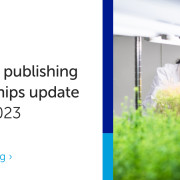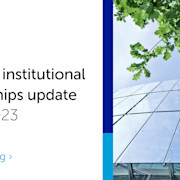- Science News
- Frontiers news
- Partner Focus – Earth Science, Systems and Society
Partner Focus – Earth Science, Systems and Society
Frontiers is working with a growing number of publishing and institutional partners, and we place great importance on our relationships with all these organizations.
Frontiers Partner Focus is a new series of profiles spotlighting some of these partners to showcase their work and demonstrate how their partnership with Frontiers supports it.

Credit: Frontiers
Our first Partner Focus looks at our publishing partner the Geological Society of London and their journal Earth Science, Systems and Society, which puts sustainability and inclusion at the forefront of Earth science.
Connecting science and society
The Geological Society of London is the oldest geological society in the world. Founded in 1807, it is the United Kingdom’s (UK) national society for geoscience and is supported by over 12,000 members worldwide.
The Geological Society’s mission is to support Earth scientists, grow interest in the natural world, and connect science, the profession and society. Core values of sustainability, inclusion, and diversity are reflected in the Society’s journal Earth Science, Systems and Society (ES3).
The journal’s scope focuses on the intersection of the Earth sciences and the social sciences, publishing work which showcases how earth scientists can help solve the challenges facing modern society.
A not-for-profit, fully open access journal, all surplus is reinvested in discounts and waivers to increase access for those without funding.
Earth Science, Systems and Society: focus on sustainability
Topics welcomed by the journal include climate change, decarbonization and energy transition, risk prevention or mitigation, management of natural resources, and the intersection of Earth science and health.
The special issue “Earth Sciences and the Race to Net Zero” spotlights the fundamental role of Earth sciences in the transition to a healthy future. Storing CO2 subsurface is a key element in the efforts to limit global warming and several articles explored the challenges of decarbonization.
One review compared different processes of CO2 storage, highlighting the main advantages and disadvantages of decarbonization strategies. Original research focused on a specific site in the North Sea, UK.
Diversity and inclusion
The Geological Society places strong emphasis on the assertion that “everybody should have the opportunity to fulfil their potential, regardless of disability, ethnicity, gender, sexual orientation, or other diversity characteristic” and signed the Science Council’s Declaration on Diversity, Equality, and Inclusion in 2014.
Diversity and inclusion are also a central part of ES3’s mission. The journal recognizes the long-standing structural and cultural barriers to access and inclusion in Earth sciences.
ES3 actively encourages inclusion and diversity in publishing as well as transparency in science. A special issue dedicated to inclusion and social justice within Earth sciences is currently accepting submissions.
Open access and partnership with Frontiers
ES3 was launched in 2021 as a gold open access journal and has been published in collaboration with Frontiers from the outset. Partnering with Frontiers was, according to the Geological Society’s Publishing Director Maggie Simmons, “motivated by Frontiers’ expertise in open access as well as by the publisher’s innovative systems and their flexible approach.“
The Geological Society’s Maggie Simmons said: “ES3 is an innovative and pioneering journal in the Earth Sciences, and we are proud of all that it has achieved so far. We look forward to continuing to collaborate with Frontiers to build on this success and further the journal’s mission.”
Robyn Mugridge, Head of Publishing Partnerships at Frontiers added: "Frontiers is honored to collaborate with the oldest geological society in the world by publishing ES3 under an open access model, and we continue to be inspired by GSL’s vision of inclusion and diversity, which aligns so closely with Frontiers’ mission to support healthy lives on a healthy planet. We look forward to an ongoing and fruitful partnership with them.”
Since launching, ES3 has published 23 articles and six special issues all of which are freely available to read and download on Frontiers open access platform.







